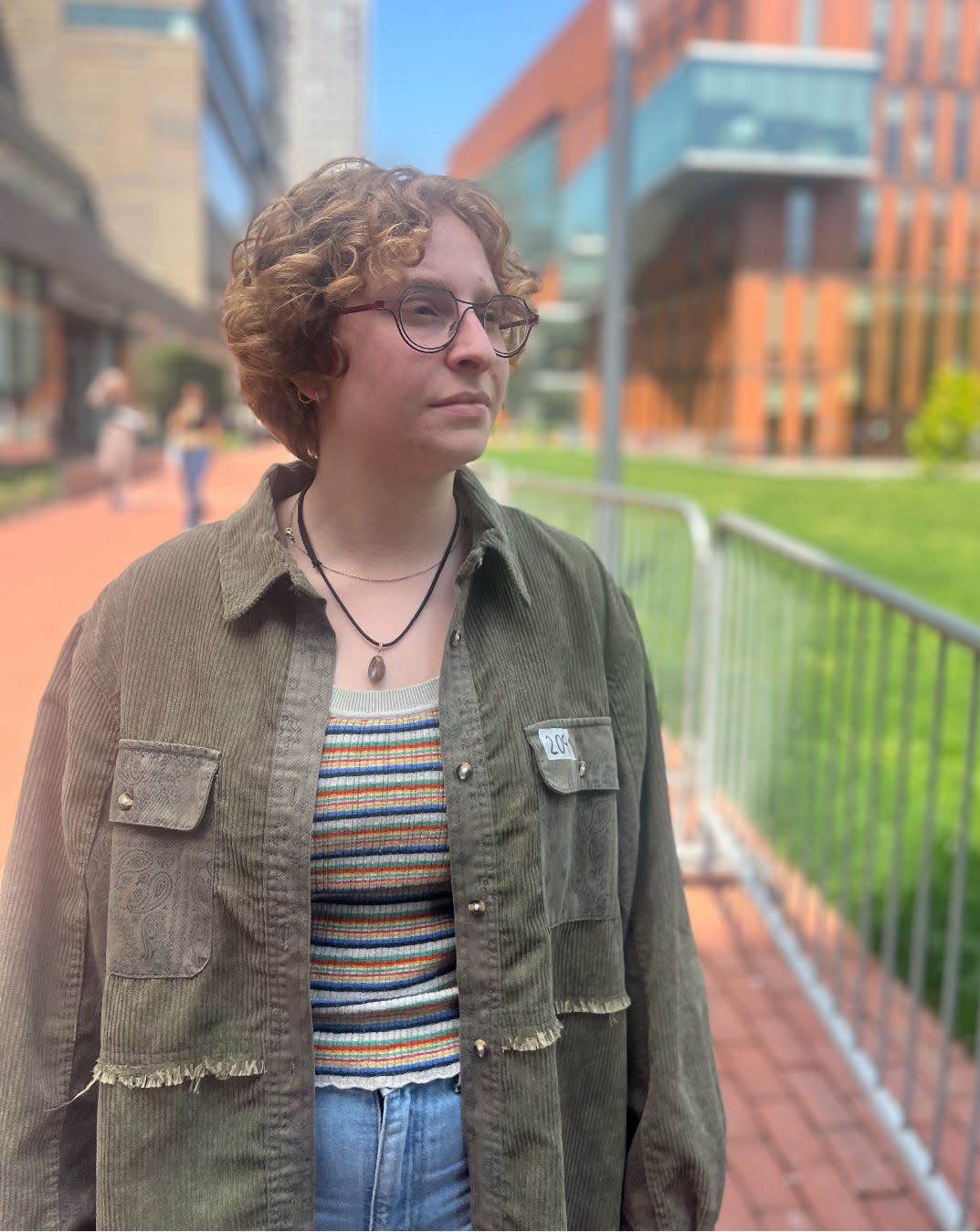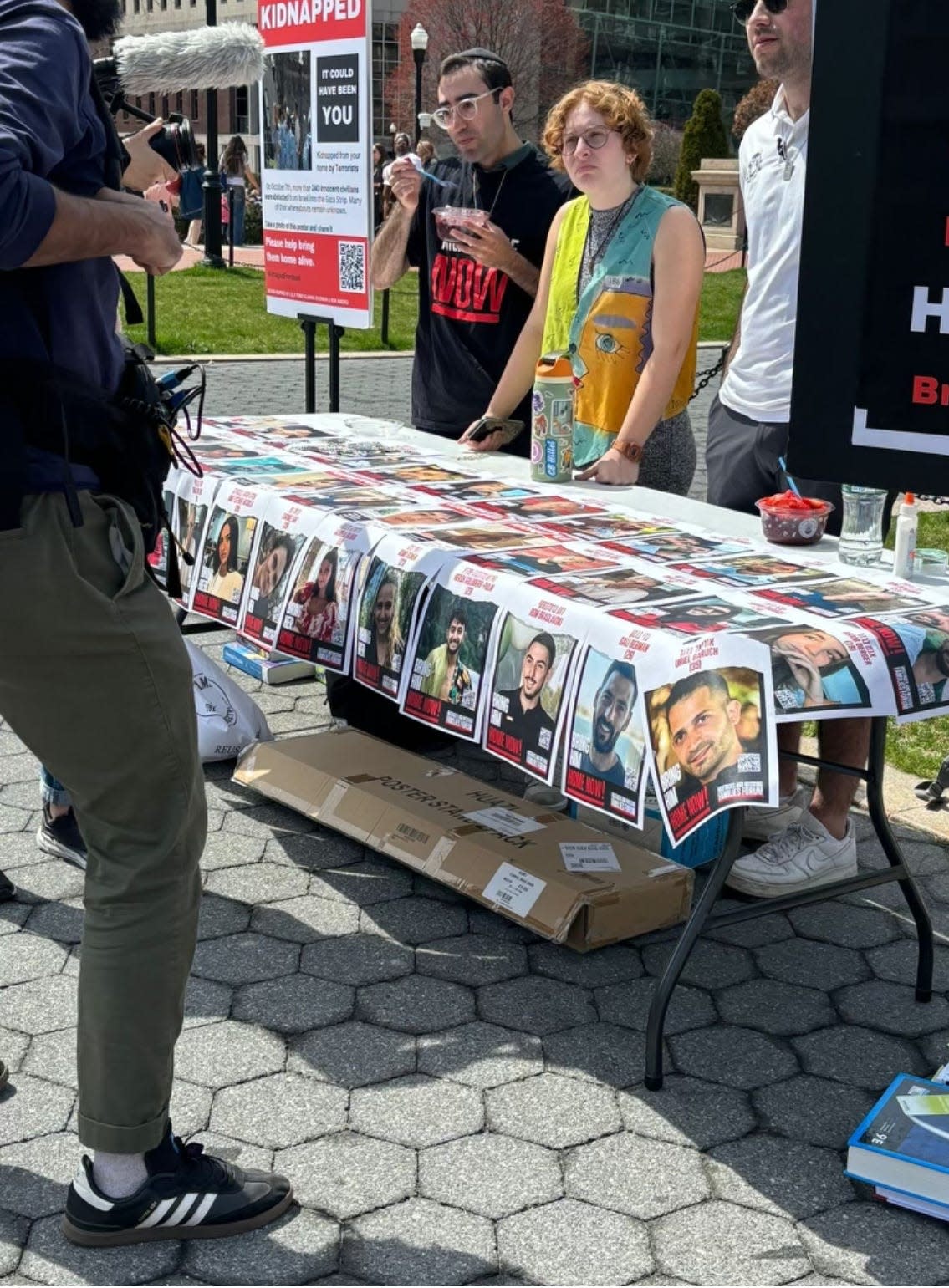What were the Columbia protests like from the inside? Mark Patinkin finds out from a student
I wondered what it’s like to be a Jewish student at Columbia University, a pro-Palestinian epicenter, but I was told most were afraid to speak publicly.
Jews there who support Israel have been shunned – even vilified – and many don't want to stick their necks out in the media.
But, finally, Columbia’s Hillel connected me with Yakira Galler.
She’s 20, grew up in Sharon, Massachusetts, and both her parents work in Providence, her dad, Ezra, an ophthalmologist and her mother, Julie, his office manager.
Yakira goes to Barnard, Columbia’s adjoining sister school. I reached her on campus Thursday, just after the weeks-long tent encampment had been dismantled and more than 100 arrested for occupying the administration building.

But Yakira told me the campus is still tense and under such a severe lockdown that she’s now not allowed to walk the few yards from Barnard to the connected Columbia side.
She’s glad she’s at the end of a long, stressful year.
Yakira is a freshman, having taken a gap year in Israel after graduating from Gann Academy, a Jewish high school in Waltham. When Barnard accepted her, she embraced the idea of a rigorous school known for its social consciousness.
“I’m a Democrat, I’m a liberal, I’m a leftist,” she told me. She’s even in favor of a Palestinian state. “I’m also a Zionist, and those things don’t contradict each other.”
But at Columbia, she said, most leftist students see her as a pariah on the side of the “oppressor” because she backs Israel’s right to defend itself – and to even exist.
I asked her for the kind of moments that have made her uncomfortable on her own campus.
Yakira remembers being in a library classroom early last December when yet another pro-Palestinian rally unfolded on the lawn outside. It became loud and disruptive, which by then was common. In many cases, she said, students would walk out of classes, or not attend them, to join protests.
After her class was over, Yakira went outside with some Jewish friends and approached a woman protester with a “Ceasefire Now” sign. Many around her wore keffiyehs and had their faces covered, which Yakira found intimidating, and still does today.
“I want a ceasefire, too,” Yakira told the woman, a fellow student, “but how do you think that’s possible when Hamas just rejected one?”
The woman, said Yakira, scoffed at her and aggressively said, “I’m not talking to you.”
“It made me realize they just wanted to be chanting and yelling and creating disruption,” Yakira told me, “and there’s no space for debating this conflict.”
It was upsetting to be barked at like that by a school peer. Yakira walked away on the verge of tears. She went back into the library to study, putting in AirPods with loud music to drown out the rally, but it didn’t work, in part because by now there were protesters on the library balconies echoing the chants.

Within a month or so after Oct. 7, Yakira felt that the Israelis kidnapped into Gaza were being forgotten, so she joined other Jewish students at a weekly outdoor “Hostage Table,” giving out pins and dog tags to raise awareness. They shared that Arab Bedouins and Thais had also been murdered that day by Hamas.
But few fellow students at Columbia wanted to hear that. Many of those going past simply glared.
“One person walked by and just screamed,” said Yakira.
A few weeks ago, she and other Jewish students organized a silent protest, standing outside to focus on sexual violence against Israelis on Oct. 7 and those in captivity. One of their signs said, “#MeToo unless you are a Jew.” She and the others put symbolic tape over their mouths, and Yakira held a sign saying, “Hamas weaponizes sexual assault.”
Some thanked them, but many others scowled and said, “Free Palestine.”
As the pro-Palestinian tent encampment was put up a few weeks ago and protests became more tumultuous, things for Yakira and other Jewish students became especially difficult. She often had to go past the tents and hundreds of masked protesters to get to class. It was upsetting to see Columbia faculty join the rallies. Although proud of her heritage, Yakira at times avoided sharing her Jewish background, and that she has relatives in Israel.
At Brown: After talking to these students, Mark Patinkin says Brown has an antisemitism problem
Finally, Columbia banned outsiders without IDs from campus, but big crowds began to rally just outside the main gate. Hundreds of Pro-Palestinian students joined on the inside doing loud call-and-response chants.
Some of the chants were intimidating, including: “We don’t want no Zionists here … We love Hamas … Keep on bombing Tel Aviv.”
There’s a now-viral photo of a woman at a Columbia protest with a sign about Hamas’s military wing saying, “Qasam’s next targets,” and an arrow pointed at nearby Jewish students. Some of those students were Yakira’s friends.
“It was like a war zone in a lot of ways,” Yakira told me.
The anti-Israel atmosphere – often anti-Jewish too, she feels – left Yakira constantly anxious, her stomach in knots. It was hard to sleep, both because of stress and the chanting going past 2 a.m. near her dorm.
Then Yakira told me something unexpected. Although she felt the students occupying the administration building should have been removed, she was upset at some of the images of their arrests.
“It was hard seeing my peers thrown on the ground,” Yakira said. “They’re still my peers.”
With the encampment now gone, the campus, she said, was weirdly quiet on the Thursday when we spoke, though many students are still wearing keffiyehs, masks and “Stop the genocide,” stickers.
On campus: Brown University protesters agree to clear encampment. In exchange, Brown will vote on divestment.
I asked Yakira if she had lost friends over this.
“Yes,” she said. “People have stopped speaking to me. Giving me the silent treatment. Like I would walk by them, and they’d avoid eye contact. I’ve been estranged in many ways.”
Has this changed how she as a Jewish student feels about Columbia and Barnard?
“I don’t feel welcome here,” said Yakira. “I feel that I’m an ‘other.’” And she often has not felt safe on campus.
But she loves her classes and the friends she still has. She plans to stay.
“This is my school,” said Yakira, “this is my community. I won’t be scared away. I hope this will pass and the war in Gaza will end and we’ll be able to heal and move forward.”
But right now, Yakira Galler is glad her freshman year is over.
And that she’ll soon be able to leave behind Columbia’s anti-Israel atmosphere – often anti-Jewish – and come home.
mpatinki@providencejournal.com
This article originally appeared on The Providence Journal: Columbia protests create unwelcome feeling student tells Mark Patinkin
